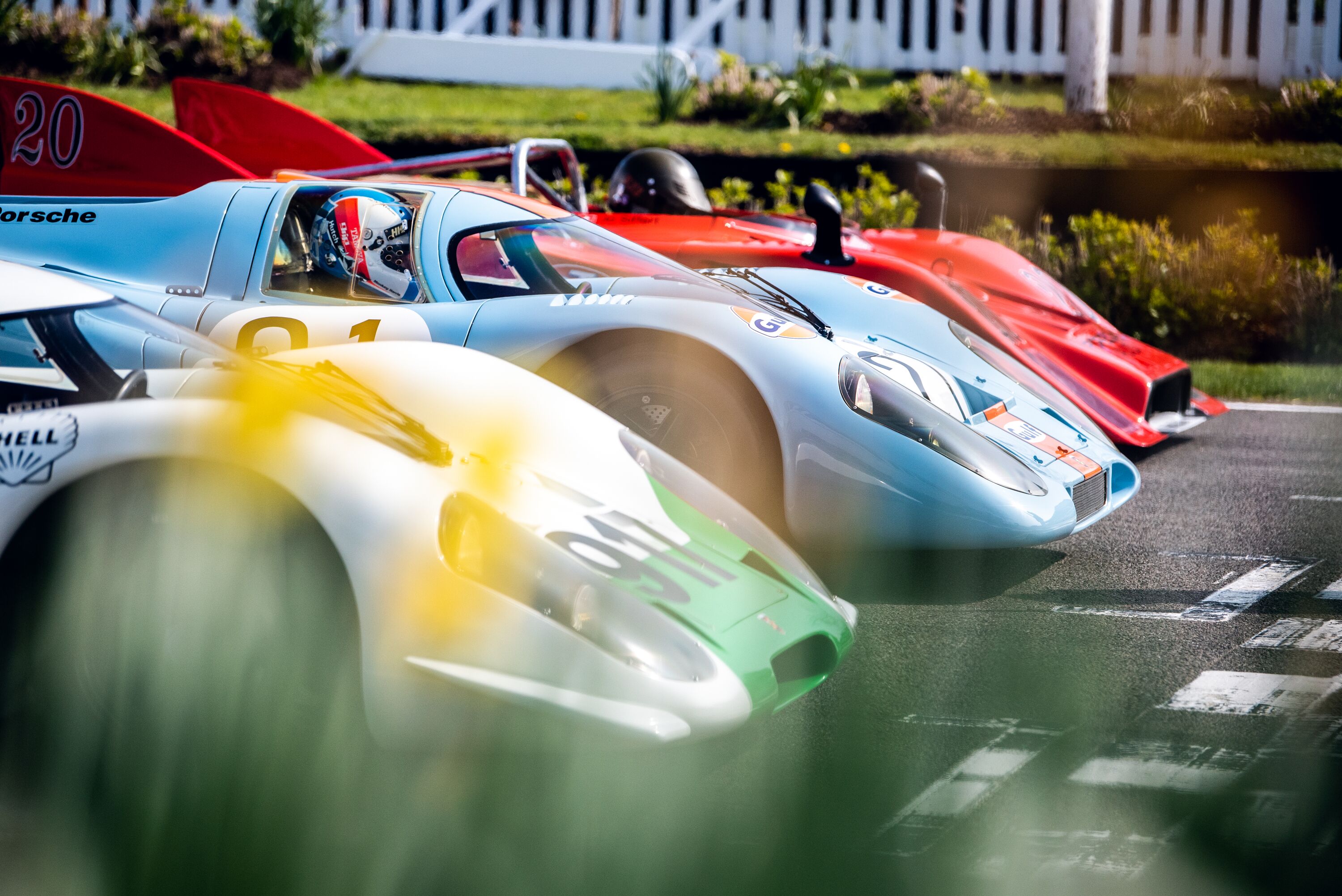6 unmissable F1 cars at the 2023 Goodwood Revival
It’s impossible to get excited about the Goodwood Revival and celebrate the past glories of the Motor Circuit without talking about Formula 1. Although Goodwood was never an official venue for an F1 championship grand prix, F1 cars raced here for more than a decade between 1953 and 1963 in various non-championship events. The list of winning drivers includes Stirling Moss, Roy Salvadori, John Surtees and Graham Hill, while the cars that competed here rank among some of the very best of the era: the likes of the Maserati 250F, Ferrari 246 and Cooper T53.
There’s just something incredible special about the F1 cars from the '50s and '60s. The sport was still so young, the cars were sleek and beautiful, the drivers charismatic and skilful. There’s a certain romance associated with seeing these small, low-slung sliding through corners like Madgwick and Lavant, evocative memories of the original heroes of motorsport. We’ll get to experience that all over again in just a couple of days, here are six unmissable F1 cars you’ll be able to see at the 2023 Goodwood Revival.

1. Maserati 250F
Racing in the Richmond & Gordon Trophies
There are two races dedicated to Formula 1 at the Revival, the first of which is the Richmond & Gordon Trophies, for 2.5-litre grand prix cars from 1952-1960, some of Formula 1’s earliest machines. One of the most successful front-engined cars of that era was the Maserati 250F, which raced from 1954-1960. From 46 entries it won eight grands prix in the hands of Juan Manuel Fangio and Stirling Moss. Its best season was in 1957, when Fangio won his fifth and final world championship with four wins. Moss once described the 250F as the best front-engined F1 car he ever drove.
It will be well represented at the Goodwood Revival, with five of them set to take to the Grid at Sunday lunchtime. Their stunning curves are pretty unmistakeable among a grid of similarly sleek F1 cars, and expect the big, powerful Maseratis to put up a strong fight against the nimbler rear-engined Coopers and Lotuses.

2. Cooper T51
Racing in the Richmond & Gordon Trophies
Speak of the devil. The Cooper T51 was a true pioneer of Formula 1, because it was the first rear-engined car to win the world championship. Cooper had broken new ground in 1958 with the introduction of the Cooper T43, the first rear-engined F1 car to ever race, but a year later, Jack Brabham took the fine-tuned T51 to the title in 1959. In all, this historic car won five races that season, two for Stirling Moss, yes him again, and one for Bruce McLaren. Its success heralded the desertion of front-engined cars, as the advantages of sticking the weight of the engine over the rear wheels proved too big to ignore.
It was cars like the Cooper T51 that saw the demise of the Maserati 250F, Ferrari 246, and these cars will be rekindling that rivalry at the Revival. In total, three T51s will be out on track, showcasing the difference in profile between front and rear-engined cars. They’re fascinating to watch; you can only imagine how much fun they are to drive.

3. Aston Martin DBR4
Racing in the Richmond & Gordon Trophies
The Aston Martin DBR4 was a sad case of ‘late to the party’. It was based on the hugely successful DB3S, and Aston was expecting big things after an extended four-year development programme. Unfortunately, as we’ve already covered above, a front-engined F1 car in 1959 was not the recipe for success. Over the ’59 and '60 seasons it entered five races with the esteemed driver pairing of Roy Salvadori and Carroll Shelby achieved very little. The lengths the marque was willing to go to were obvious, but unfortunately the car was never competitive.
Regardless of its speed in period, the DBR4’s scarcity is its main draw. This is real evidence of a little-known corner of Formula 1 history, the original Aston Martin entry. You never know, it might even kick up a surprise this weekend at the Revival. If nothing else, that gorgeous British Racing Green livery will glisten in the sunshine.

4. Lotus 25
Racing in the Glover Trophy
Stepping forwards into the 1960s, the rear-engined revolution was complete, and it was Lotus, with its 25 that had established itself as the team to beat in the new 1.5-litre era of F1. The lightweight engine suited Colin Chapman’s design philosophy perfectly, and Jim Clark dominated the 1963 season with seven wins to take the world championship by a country mile. In all, between 1962 and ’67, the Lotus 25 was entered in 49 grands prix and won 14 of them, all in the hands of Jim Clark.
The Glover Trophy is always an entertaining showcase of Formula 1’s smallest era of racing. Those tiny engines require a very specific way of driving that relies on momentum, meaning you can expect to see these lightweight torpedoes sliding their way around our fast and flowing Motor Circuit. The Lotus 25, in its eye-catching Lotus colours with those striking yellow wheels is going to be difficult to miss.

5. BRM P578
Racing in the Glover Trophy
Another car with impressive longevity during the 1960s was the BRM P57. It raced in 1962 as the P578, a car that Graham Hill took to his first drivers’ championship. He won four races that year, as BRM managed to forge an advantage over Lotus – a rivalry that continued for much of the next decade –thanks in part to its more powerful V8 engine built in-house by BRM.
That rivalry is set to be rekindled once again this weekend, as the P578 will be battling with a host of Lotuses, Coopers and Brabhams from the early 1960s. Just one will line up on the grid, but you’ll be able to listen out for its distinct 11,000rpm engine note as it steams down the Lavant Straight.

6. Tyrrell 006
Participating in the Sir Jackie Stewart Celebration
Our final pick is sure to be a special one for everyone at the Revival this weekend. Jackie Stewart’s Tyrrell 006, the car that he drove to his third and final Formula 1 world championship in 1973. It was by no means the perfect season for Jackie, his friend and team-mate Francois Cevert was killed at Watkins Glen, but his final triumph helped to cement his position as one of the greatest drivers of all time.
The Tyrrell 006 was first introduced in 1972, where Cevert drove it at the final two races of the season. It wasn’t until the third round of 1973 that Stewart got his hands on the wheel of his new toy. He won first time out at the South African Grand Prix, and on a further four occasions as he strolled to the title. After Cevert’s devastating accident Stewart walked away from the sport, but his legacy will remain forever set in the foundation of Formula 1 as we know it.
On both Saturday and Sunday, the 006 will be in action on the Motor Circuit, as we pay homage to one of the true heroes of motorsport. It’s a beautiful car, and this will be a rare opportunity to see it in motion. To have our Jackie back at the wheel of his championship-winning car will be an extremely special and likely emotional moment.
Images courtesy of Motorsport Images.
F1
Formula 1
Revival
Revival 2023
Maserati
250F
Cooper
T51`
Aston Martin
DBR4
Lotus
25
BRM
P578
Tyrrell
006




































































